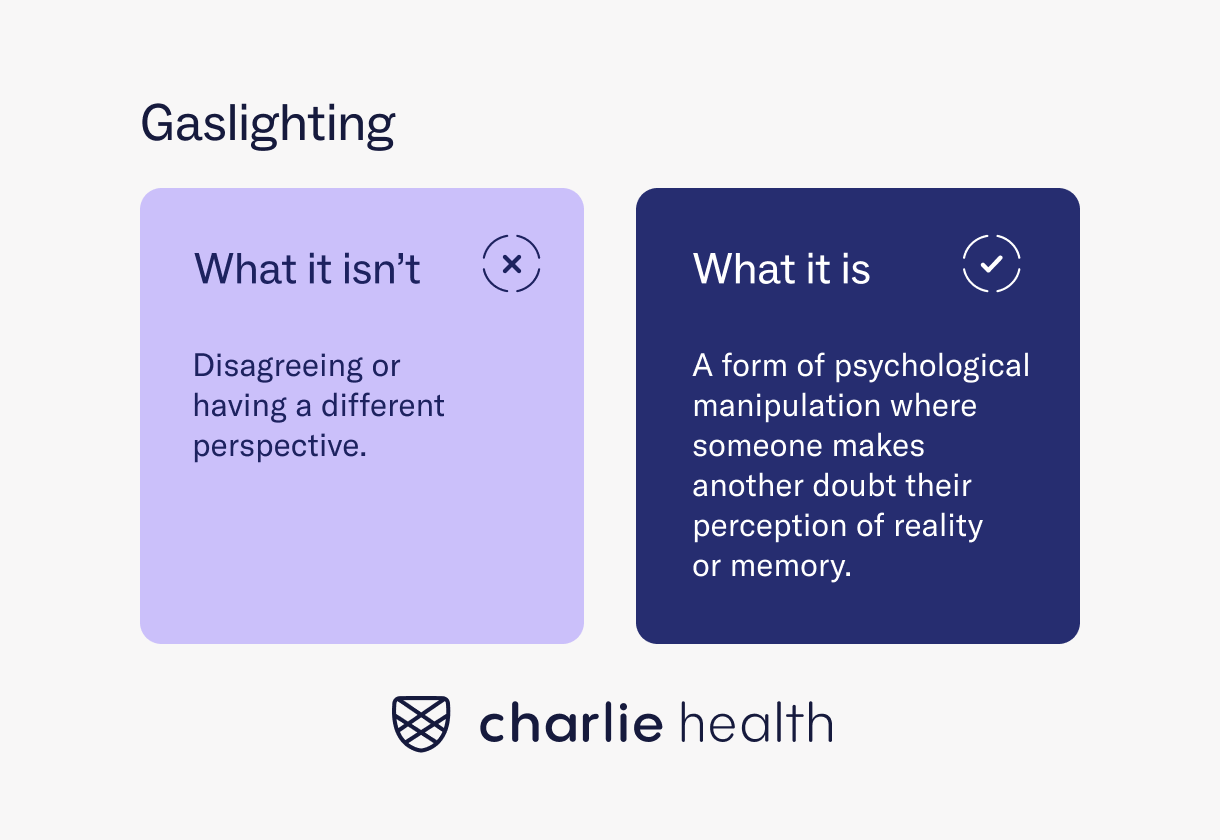
Table of Contents
What Gaslighting in a Relationship Actually Looks Like

Written By: Sarah duRivage-Jacobs

Clinically Reviewed By: Dr. Don Gasparini
November 9, 2023
9 min.
Around 74% of adult female intimate partner violence survivors may experience gaslighting in a relationship. Here’s how it can show up and what steps survivors can take to recover from the abusive behavior.
Learn more about our Clinical Review Process
Table of Contents
If you or someone you know is experiencing any type of abuse, call the National Domestic Violence Hotline at 1-800-799-7233 (SAFE) or 1-800-787-3224 (TTY) for anonymous, confidential help available 24/7.

Most people have likely heard about gaslighting—a psychological concept that got its name from the 1930s play and 1940s film “Gaslight.” In it, the lead character is deliberately pushed by her husband to the point of questioning her reality, all for financial gain. From this, the term “gaslighting,” which refers to a form of abuse where someone makes another person question their reality, was born.
Gaslighting has increasingly risen in online popularity in recent years, even becoming Merriam-Webster’s word of the year in 2022. While gaslighting can happen in all kinds of relationships, it’s also a known sign of unhealthy romantic relationships. Below, we’re explaining what gaslighting in a romantic relationship is, how it can show up, and what steps survivors can take to recover from the experience.

We support survivors
Charlie Health offers trauma-informed groups with people who have been there, too.
What is gaslighting in a relationship?
Gaslighting is a form of emotional or psychological abuse. In romantic relationships, the gaslighter will try to make their partner question their reality. Being on the receiving end of gaslighting in a relationship is a type of intimate partner violence (IPV) that isn’t always obvious to outside observers. Nevertheless, it is a form of abuse. In fact, some research suggests that emotional abuse can be more harmful in the long term than physical forms of abuse.
How common is gaslighting in a relationship?
While there isn’t a lot of data regarding the prevalence of gaslighting in relationships, around 74% of adult female IPV survivors may experience it, according to a 2014 report. As mentioned, gaslighting is a form of IPV, which itself is unfortunately common. Research shows that more than one in three people assigned female at birth and one in four people assigned male at birth have experienced IPV of any kind. It’s even more common among transgender and nonbinary individuals, more than half of whom will experience IPV, according to research.

Here’s How Intimate Partner Violence Impacts Survivors’ Mental Health
Sarah duRivage-Jacobs
How can gaslighting show up in a relationship?
In 2020, researchers out of Canada surveyed 65 adults who self-reported being gaslit in romantic relationships that lasted four months or longer. The most commonly reported behaviors were insults and accusations, including blaming survivors for all problems in the relationship. Here are some examples of how this gaslighting behavior can look in a relationship.
Insults and accusations
Gaslighting partners challenged survey participants’ self-knowledge and sense of reality through various insults and accusations.
Participants were often accused of:
- Being “crazy”
- Being “overly emotional”
- Being “overly sensitive”
- Being “slutty”
- Cheating on their partners
- Having memory problems
Participants were also called insulting and misogynistic words, like:
- “Ugly”
- “Selfish”
- “Stupid”
- “Dumb”
- “Slut”
- “Whore”
Blaming
Many survey participants reported being told things were their fault even when they weren’t. Some instances of blame suggested that the participants were responsible for everything negative that happened in their relationship. This, as the researchers wrote, identifies a form of gaslighting where survivors are led to question what is and isn’t in their control.
Examples of blaming behaviors included:
- Being blamed for something breaking when it wasn’t their fault.
- Being blamed for something the gaslighter did that was wrong or disrespectful, like saying it was their fault the gaslighter cheated.
The cycle of gaslighting in a relationship
Using the results of the 2020 survey, researchers created a three-stage behavioral model representing the possible cycle of gaslighting in relationships. The cycle is as follows:
Stage 1: Love bombing
Stage 2: Gaslighting cycle
Stage 3: Insight and recovery
When someone overwhelms their new partner with affection and love, aiming to create strong emotional attachments. This can make the survivor overlook potential warning signs and see their abusive partner in a positive light later on.
Survivors may excuse their abusive partner’s actions due to worry about how they are seen, which isolates them from loved ones who view the actions as abusive, and then reinforces the cycle and leads to a weakened sense of self and greater distrust of others.
The initial recovery step from gaslighting is recognizing the manipulation, which allows survivors to change their perspective on their partners and break the cycle.
Stage 1: Love bombing
Love bombing is a common tactic used at the start of relationships that eventually involve gaslighting. Love bombing is when a gaslighter overwhelms their new partner with expressions of love and affection. This tactic is used to form emotional attachments so the survivor is more likely to ignore later “red flags” and view their abusive partner positively. If the gaslighter were to begin gaslighting right away, their partner may not be attached enough to withstand it. In cycles of gaslighting, love bombing may also be used later in a relationship to maintain the relationship.
Stage 2: Gaslighting cycle
The researchers suggested that the gaslighting cycle contains three interacting feedback loops that make the abuse less observable:
- Survivors may be worried about how the gaslighter perceives them. Being concerned about perception might motivate survivors to rationalize the gaslighter’s behavior in order to view the gaslighter as positive.
- Isolation of the survivors from friends and family is a common feature of gaslighting. When survivors are isolated, they may have less opportunity to gain an outside perspective on their partner’s behavior.
- Gaslighting behaviors, rationalization, and survivor isolation reinforce the cycle. The impact on the survivor also keeps these feedback loops going by contributing to a diminished sense of self, guardedness, and mistrust of people outside the relationship.
Stage 3: Insight and recovery
The first step in recovery from gaslighting in a relationship is acknowledging that they’re being gaslit. By reframing their partner’s behaviors, survivors can eliminate the need to view their partners in a positive light and disrupt the cycle.
What are the effects of gaslighting in a relationship?
As with any form of IPV, gaslighting in a relationship can lead to negative outcomes for the survivor. Here are some common effects of gaslighting in a relationship, as reported in the aforementioned 2020 study.
Diminished sense of self
Survey participants reported feeling worthless, confused, and like their sense of self had been broken. One participant said, “[I] barely felt like a person anymore. I suppose it did get worse, but when your perception of the truth gets warped, it’s hard to tell up from down.” With their sense of self diminished, survivors may wonder how they can function without their partners.
Increased guardedness and increased mistrust of others
Participants also expressed feeling more guarded and mistrustful of others after leaving relationships with gaslighting. In some cases, they continued to isolate themselves. As one participant said, “I’m still paranoid that people are trying to undermine me, that I can’t express my own feelings or opinions because someone will try to change them or take them away from me, or make me feel less than myself. It definitely has made me more guarded and paranoid.”
IPV survivors may also be more likely to experience mental health symptoms and conditions like:
- Stress
- Fear
- Isolation
- Anxiety
- Depression
- PTSD
- Substance use disorder
- Personality disorders (e.g., borderline personality disorder, narcissistic personality disorder)
- Psychosis
- Self-harm
- Suicidality
If you’re experiencing suicidal thoughts and think you’re in danger of harming yourself, this is a mental health emergency. Contact 988, The Suicide & Crisis Lifeline.

Why do people gaslight partners in relationships?
Based on secondhand reports from survivors, the researchers of the 2020 survey hypothesized that there were two main categories of motivations for gaslighting in relationships: avoiding accountability and control.
Avoiding accountability
Avoiding accountability was the most common motivation identified by the researchers. In many cases, gaslighters were avoiding accountability for something they did—often cheating. In some cases, the gaslighting tactic was used to avoid the typical responsibilities of relationships, like parenting children.
Many gaslighters were trying to avoid accountability for patterns of bad behaviors. They would deny the pattern existed and often blame their partner or imply they were only upset because of their own deficiencies.
Asserting control
Gaslighting may also be used to control a partner. Some participants reported being prevented from accomplishing goals that would lead to increased independence, like starting a new career or continuing education. When this happened, the survivors’ abilities and perceptions were put into question.
Gaslighters whose motivation was rooted in control often used other forms of psychological manipulation and coercive control, such as threats, verbal abuse, rules, and property damage.
In most of the survey responses, a combination of motivations was present. For example, a gaslighter might use gaslighting behaviors to avoid accountability for controlling behaviors—or they may control their partners in an effort to avoid accountability.
Healing after gaslighting in a relationship
For some survivors of gaslighting in relationships, leaving their partners is a significant aspect of healing. But we know that not everyone is able to leave an abusive relationship. Aside from leaving relationships, the 2020 survey and other IPV research highlights recommendations for the healing process.
Spending time with loved ones
The most commonly reported part of the recovery process for the survey participants was spending time with people who reinforced survivors’ trust in themselves. Activities mentioned included chatting with friends, going out, playing board games, and participating in hobbies.
Engaging in “re-embodying” activities
Activities that put survivors in their bodies and helped them clarify their sense of self were also important for the survey participants. Examples included yoga, meditation, and sports. Creative activities that were helpful for self-expression and self-identity were also mentioned a lot by participants, including writing, journaling, and creating art. Performing music is an effective combination of the two hobby types, spanning embodied activity and creative expression.
Establishing healthy boundaries and a stronger sense of self with therapy
Establishing healthy boundaries and developing a stronger sense of self was also key for survey participants. Achieving these things can look many different ways, but psychotherapy may be an especially helpful avenue.
Research has consistently demonstrated how psychotherapy can be an effective treatment for IPV survivors. In psychotherapy, people can work toward their own goals—some of which can be healthy boundaries and sense of self. According to experts, IPV survivors may benefit from several forms of psychotherapy:
- Cognitive behavioral therapy (CBT) and other cognitive therapies like Skills Training in Affective and Interpersonal Regulation (STAIR), Helping to Overcome PTSD through Empowerment (HOPE), cognitive processing therapy (CPT), and Cognitive Trauma Therapy for Battered Women (CTT-BW). This last term has become less used over time as experts realized its insensitivity to IPV survivors.
- Interpersonal psychotherapy (IPT)
- Eye movement desensitization reprocessing (EMDR)
- Culturally relevant options include Relapse Prevention and Relationship Safety (RPRS) and The Grady Nia Project.
Support for survivors at Charlie Health
If you’re currently in a relationship with gaslighting or have been in one before and are looking for mental health support, Charlie Health is here to help. Abuse of any kind can take a toll on your mental health, and you don’t have to heal alone.
Charlie Health’s virtual Intensive Outpatient Program (IOP) offers compassionate, high-touch mental healthcare from the comfort and privacy of home. Young people recovering from gaslighting, IPV, or any form of trauma can access psychotherapy with family therapy and supported group sessions with peers dealing with similar challenges.
Charlie Health’s team of trauma-informed mental health professionals pull from a range of therapeutic modalities—including evidence-based therapies for survivors of IPV and other traumatic experiences—to personalize a care plan for each client.
Everyone deserves access to high-quality and effective mental healthcare. Charlie Health works toward that goal by accepting many major insurance plans as well as Medicaid.
Think Charlie Health might be right for you or a loved one? Fill out this short form for a free assessment.
Additional resources for IPV survivors
If you or someone you know is experiencing gaslighting in an abusive relationship, there are resources available that can help:
- The Abused Deaf Women’s Advocacy Services
- Break the Cycle
- Casa de Esperanza
- The Domestic Violence Initiative
- INCITE! Women of Color Against Violence
- Manavi
- The National Child Abuse Hotline/Childhelp
- The National Center on Domestic Violence, Trauma & Mental Health
- The National Coalition Against Domestic Violence
- The National Dating Abuse Helpline
- The National Deaf Domestic Violence Hotline
- The National Domestic Violence Hotline
- The National Indigenous Women’s Resource Center
- The National Resource Center on Domestic Violence
- The National Sexual Assault Hotline
- Safe Horizon
- The Women’s Law Organization




